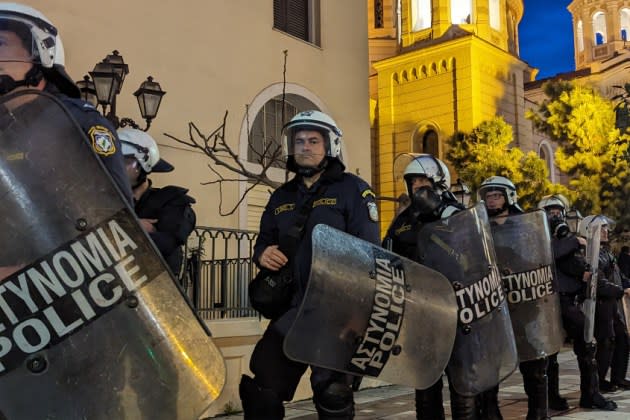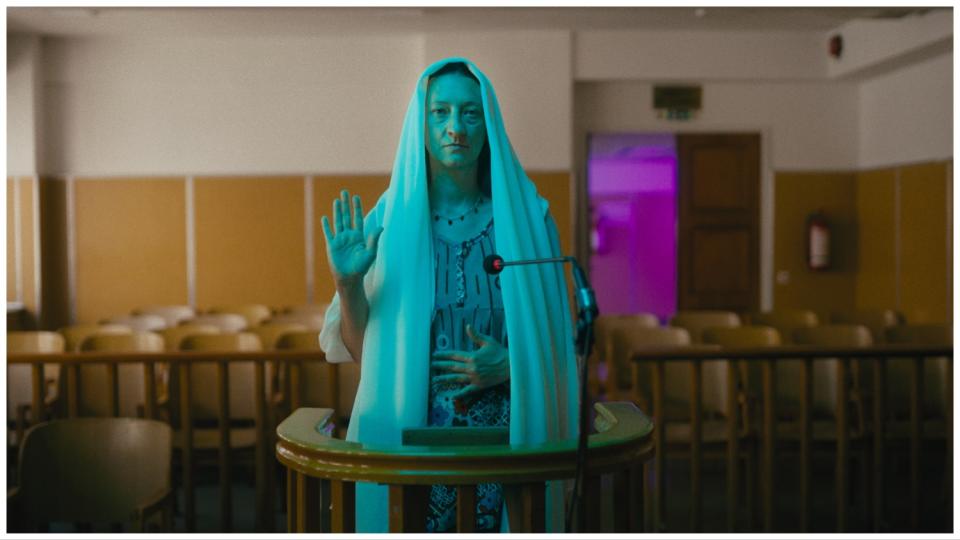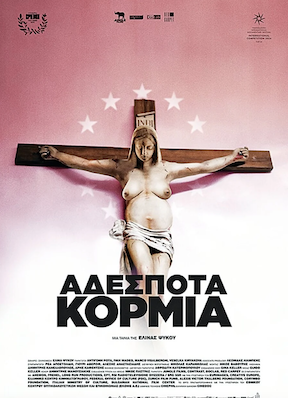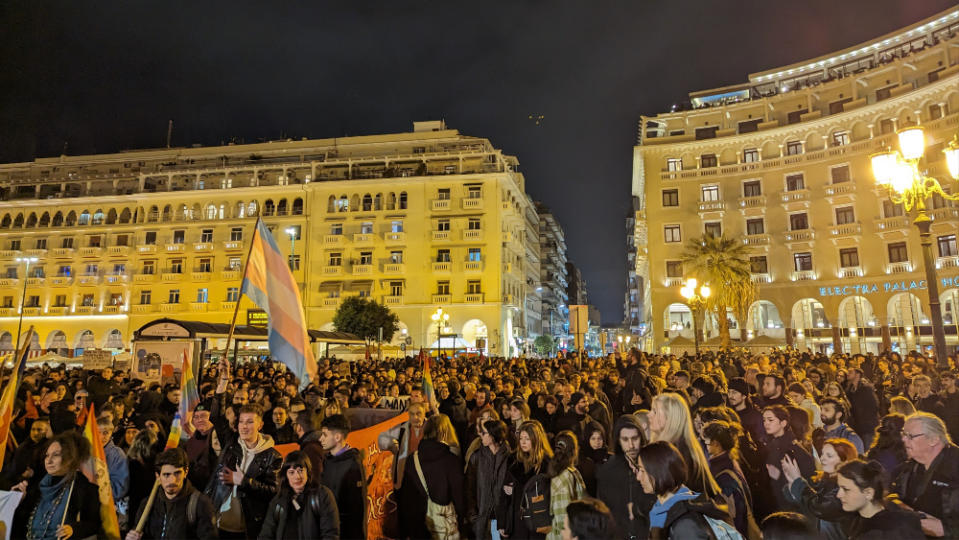Riot Police Deployed Amid Threats to Thessaloniki Doc 'Stray Bodies'

Riot police were deployed Tuesday night in Thessaloniki and protests across the city were banned ahead of the premiere of Greek filmmaker Elina Psykou’s “Stray Bodies.”
Far-right groups had previously announced plans to disrupt the opening night of the documentary, whose poster features a bare-breasted pregnant woman nailed to a cross and had been deemed “blasphemous” by church officials and right-wing political leaders.
More from Variety
The day’s events followed a fortnight of roiling controversy over the Tribeca-winning director’s documentary debut, which follows the lengths that women in Europe must go to access medical procedures that are outlawed in their own countries.
Appearing in front of a full house before the premiere at Thessaloniki’s historic Olympion theater, an emotional Psykou was greeted with rousing, sustained applause. “Thank you. You’re fantastic. I love you,” the director told the audience. “I’m very happy to have my world premiere at the Thessaloniki film festival. It’s the best festival in the world, the most welcoming. And you are all amazing people.”
The premiere, which went off without incident, came after several nervy days as festival leadership worked in concert with local authorities to determine how to successfully mount Tuesday’s screening and ensure the safety of the filmmakers and audience members.
Earlier this week, religious groups in Greece’s second city circulated a call for an “awakening,” claiming that the documentary’s supporters “aim to demolish our ancestral values” and urging protesters to gather outside the Olympion before the premiere. Citing the heightened threat level, authorities Tuesday morning announced a ban on all public demonstrations until midnight.
In the end, the measures appeared to have the desired effect, as far-right demonstrators steered clear on opening night. Instead, a crowd of roughly 200 counter-protesters chanting “death to fascism” mobilized in defiance of the public ban. They were eventually marshaled from the scene by several dozen officers in riot gear.

The episode — which came just days after a horrific attack on a transgender couple shocked the Thessaloniki Documentary Festival — capped off a heated two weeks since the first images of the poster for “Stray Bodies” were released on social media, rattling right-wing lawmakers and commentators in the conservative Orthodox nation.
On March 1, Greek parliamentarian Komninos Delveroudis, of the far-right Victory party, blasted the “provocative, blasphemous and unsightly” poster and insisted that it “openly offends morals, blaspheming the holy symbol of the cross and the holy faces of the crucified Christ and the Virgin Mary.” He also called on the government “to restore the criminal provisions for the malicious blasphemy and defamation of religion.”
That comment drew a scathing response from the Greek Documentary Association, which criticized the Victory party’s “Taliban mentality” and sounded the alarm over a call “to bring back penal provisions which prosecute anyone who dares to express in any way, artistic or political, views which are not to the liking of its self-styled fundamentalist ‘ministers of the Greek people.’”
Meanwhile, opposition lawmaker Kyriaki Malama, of the left-wing Syriza party, said that such proclamations from Victory’s “uninvited inquisitor” “cannot shake our democratic freedoms,” adding: “To these gentlemen and to the Middle Ages they represent, we reply that we call on the world to be at the screening of the documentary at the Thessaloniki festival to raise a shield of democracy against their dangerous views.”
“Stray Bodies” is an urgent and timely documentary from the Tribeca prize winner Psykou (“Son of Sofia”), which follows women who are denied access to abortion, in-vitro fertilization and euthanasia in their own countries and must travel the length of Europe to undertake the procedures.
Documenting the physical, emotional and economic tolls of such “medical tourism,” the film is a scathing indictment of the male-dominated state and religious institutions in Europe that exercise more power over women’s bodies than women themselves.
Speaking to Variety ahead of the premiere, Psykou admitted she was stunned by the ferocity of the far-right backlash. “When we made this poster, we knew that it would provoke some conversation, but we didn’t imagine this kind of reaction,” she said. “With the film, we want to open a dialogue. And we thought, with the poster, we could open a dialogue. But now, there’s no dialogue. There are only monologues.”

Designed by Nikos Pastras, the poster has provoked a heated response from conservative critics not only for its depiction of a half-naked pregnant woman on the cross, but for its specific evocation of the Virgin Mary — a comparison that Psykou said she preferred to leave to the eye of the beholder.
“Some people will [interpret] this as the Virgin Mary, and for some other people, this is just a woman,” she said. “For me, the Virgin Mary is the symbol of maternity and the symbol of womanhood.” Ultimately, she added, it’s up to the viewer to “see in this woman whatever they want to see.”
Since the poster art began to circulate in Greece, Psykou has been on the receiving end of relentless attacks on social media, while threats of physical violence against her and Pastras — as well as credible threats against the festival — inspired Thessaloniki police to implement the protest ban on Tuesday.
The director insisted that such attacks are “not Christianity,” but religious leaders have helped stoke the outrage in recent days. On March 10, the Metropolitan of Thessaloniki — a spiritual leader in this deeply religious city — urged Elise Jalladeau, the general director of the Thessaloniki Documentary Festival, not to allow the movie’s poster to be displayed during the 11-day event, calling it “deeply offensive to the religious feelings of the city’s Christians” and placing it alongside other polarizing works that “touch — and sometimes even exceed — the limits of malicious provocation and malicious intent.”
On Monday, Greek deputy minister of culture Christos Dimas rejected calls on the government to intervene, citing the constitution’s protection for freedom of expression and asserting that “under no circumstances does the state attempt to censor art,” insisting: “In no way is the Orthodox Christian faith in danger from [a movie poster].”

Tuesday’s events occurred just three days after Aristotelous Square witnessed a shocking attack by a mob of between 150-200 youths against a transgender couple. The horrific episode took place against the backdrop of a festival that has a spotlight on queer cinema as one of its focal points.
On Sunday night, thousands of LGBTQ activists and allies took to the streets of Thessaloniki in a rousing show of solidarity with the victims, waving rainbow flags, carrying placards denouncing homophobia and transphobia and chanting protest slogans, insisting: “We are not afraid!”
“Stray Bodies” will next travel to CPH:DOX in Copenhagen, where it will screen in the F:ACT AWARD section.
The Thessaloniki Documentary Festival runs March 7-17.
Best of Variety

